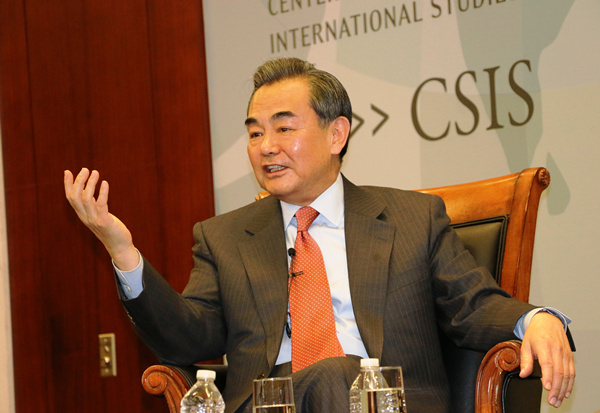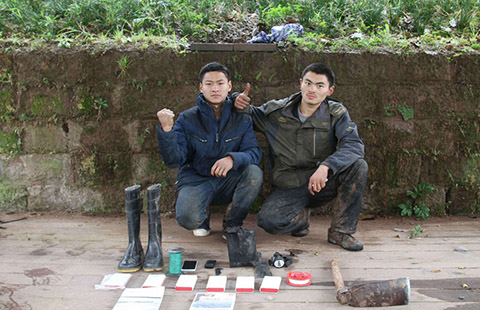China urges US to fully explain missile defense system deployment
By Zhang Yunbi (chinadaily.com.cn) Updated: 2016-02-26 12:30
 |
|
Chinese Foreign Minister Wang Yi talks about China-US relations and China's economic development in the Statemen's Forum at the Center for Strategic and International Studies in Washington on Thursday. During his US visit, which began on Monday and ended on Thursday, Wang met with US President Barack Obama, Secretary of State John Kerry and other top US government and opinion leaders, and discussed important bilateral, regional and global issues. [Photo by Chen Weihua/China Daily] |
Foreign Minister Wang Yi has said "a convincing explanation must be provided to China" and "legitimate national interests must be upheld in the process" as the United States looks set to deploy the THAAD missile defense system in the Republic of Korea.
When addressing the Washington-based think tank, the Center for Strategic and International Studies on Thursday, Wang noted that the X-band radar associated with the THAAD system has a radius that "reaches into the interior of China".
The X-band radar is known to locate missiles as far off as 2,000 km, encompassing areas in China and Russia that border the Democratic People's Republic of Korea.
The ROK and the US are expected to launch a joint working group next week to discuss the deployment in the ROK territory of THAAD, Seoul-based Yonhap news agency reported on Thursday, citing a government source.
Preliminary talks between Seoul and Washington have already started on THAAD deployment. The joint working group was originally scheduled to be launched on Tuesday, but it was delayed at the request of the US, according to the Yonhap report.
Wang said that "it's up to the ROK government to make a final decision" and China does not interfere in the internal affairs of other countries.
"We believe China's legitimate security concerns must be taken into account, and a convincing explanation must be provided to China. I don't think it's too much to ask. It's a reasonable position," Wang added.
On the situation on the Korean Peninsula, Wang said China "cannot allow nuclear weapons on the Korean Peninsula, either in the north or in the south, either developed indigenously or introduced from the outside".
Nuclear weapons on the peninsula "would be detrimental to the interests of all parties", Wang added.
Calling on the relevant parties to resume peace talks on the nuclear issue, Wang noted China, the chair of the Six-Party Talks, has put forward pursuing, through a "dual track approach", the denuclearization of the Korean Peninsula, and the replacement of the Korean armistice with a peace agreement.
He said China is "prepared to work with the relevant parties to work out the pathway and steps for this dual-track approach".
"In other words, without denuclearization there will not be a peace agreement. On the other hand, without a peace agreement and without addressing the legitimate concerns of the parties, including those of the DPRK, then denuclearization cannot be achieved in a sustainable way," Wang added.
- Some Tibetan plants can predict Indian monsoon
- Chinese scientists create functional sperm from stem cells in lab
- 2nd-child plans vex female job seekers
- Court takes case of improper detention
- Projects opening to overseas researchers
- Streamlined processes to aid top talent
- Two smog hot spots identified in Beijing by think tank
- China-led gravitational wave venture seeks global talent
- Gated communities will open 'gradually', says ministry
- Watchdog pledges to intensify scrutiny







